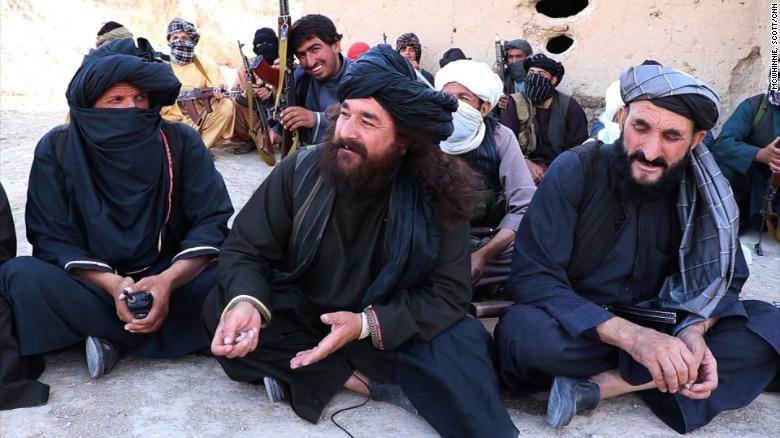Is the Trump team pulling off a diplomatic coup to end America's longest war?

By Peter Bergen, CNN National Security Analyst
Updated 4:47 AM ET, Tue January 29, 2019
Peter Bergen is CNN's national security analyst, a vice president at New America and professor of practice at Arizona State University. He has reported from Afghanistan for two and a half decades and is the co-editor of "Talibanistan: Negotiating the Borders Between Terror, Politics, and Religion." The opinions expressed in this commentary are his own; view more opinion at CNN.
(CNN)Negotiations between the Taliban and US officials appear to have produced a breakthrough: A framework for an agreement that the Taliban will not host any foreign terrorist groups in exchange for the withdrawal of US troops from Afghanistan. In this framework agreement, the Taliban would also agree to a ceasefire and start talks directly with the Afghan government, according to the New York Times.
There could be much to celebrate in such an agreement, which may, perhaps, end America's longest war.

Peter Bergen
The Afghanistan negotiations have had none of the hoopla surrounding them that President Trump has injected into his discussions with North Korean dictator Kim Jong Un about his nuclear program. So far, the North Korean negotiations have yielded nothing of substance, while the quiet discussions with the Taliban look like they might bring to a close the war that began after al Qaeda, which was based in Afghanistan, attacked the United States on September 11, 2001.
Zalmay Khalilzad, who served as US ambassador to Afghanistan for President George W. Bush and is now President Trump's special representative for Afghanistan, spearheaded the negotiations with the Taliban.
Khalilzad posted on Twitter on Saturday that he had just wound up six days of talks with the Taliban in Doha, the capital of Qatar, and that the "meetings here were more productive than they have been in the past. We made significant progress on vital issues."
Khalilzad also tweeted that he had briefed Afghan President Ashraf Ghani in Kabul on Sunday "on the progress we have made."
A signal of the seriousness with which the Taliban are approaching the talks with the Americans is that their negotiating team is headed by Mullah Baradar, a founder of the Taliban who was released from prison in Pakistan in September, seemingly for the purpose of moving peace talks forward.
This was a key development as the Taliban is splintered into a number of different groupings and factions, and only someone as senior in the Taliban as Mullah Baradar can speak for the whole movement.
Why now?
After 18 years of war, why have the United States and the Taliban finally come to the negotiating table in a meaningful way? The American academic I. William Zartman pointed out that warring parties usually only start seriously negotiating when they have come to recognition of a "mutually hurting stalemate."
A year ago the previous US commander in Afghanistan, General John "Mick" Nicholson, testified before the Senate Armed Service Committee that the Afghan War was indeed in a "stalemate."
For their part, the Taliban have fought for almost two decades and have yet to hold an Afghan town or city for anything more than a few days.
Add to this mix President Donald Trump, who has long been a skeptic about doing more in Afghanistan, and who tweeted in 2013, "Let's get out of Afghanistan. Our troops are being killed by the Afghanis we train and we waste billions there. Nonsense! Rebuild the USA."
The recognition of a mutually hurting stalemate between the Taliban and the United States, as well as Trump's skepticism about the American role in Afghanistan, have all combined to produce this moment in which some kind of peace deal may be possible.
Key questions
However, the devil will be in the details if a real peace is to be achieved with the Taliban.
First, will the Taliban agree to abide by the Afghan constitution that was ratified in 2004 and guarantees the rights of women to work and girls to be educated? When the Taliban was in power before being ousted shortly after the 9/11 attacks, they denied women and girls these fundamental rights.
Second, will the Taliban agree to a ceasefire with the Afghan forces that are doing most of the fighting against the Taliban? The Taliban position has long been they only want to negotiate with the Americans, but clearly the next step toward peace is to enter into discussions with the Afghan government.
Third, will the Taliban engage in normal politics in which they might be granted certain government ministries or provincial governorships? And will they promise not to interfere in the key Afghan presidential elections that are scheduled for July?
Fourth, will Western hostages that are held by the Taliban be released? These include US citizen Kevin King, 62, who is believed to be seriously ill, according to NBC News, and Australian citizen Timothy Weeks, 50, who were kidnapped in 2016 in Kabul near the American University in Afghanistan, where they were both teachers.
Fifth, will an American peace deal with the Taliban really end the war? Simply because American forces withdraw doesn't mean the war might not continue between the Taliban and the Afghan government. You only have to look at the rise of ISIS in Iraq during 2014, following a complete American withdrawal from the country three years earlier, to see how bad things could also get in Afghanistan absent American forces.
Sixth, what are the enforcement mechanisms to ensure that the Taliban abides by any agreement on barring foreign jihadist groups, or any other agreements they might enter into.





